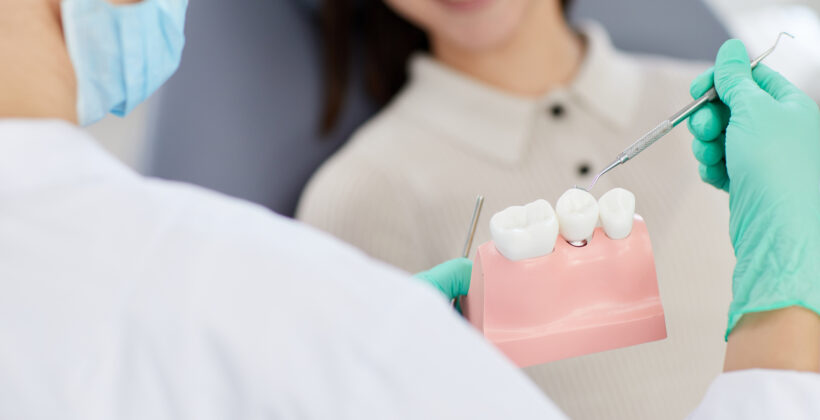Do you have a tooth that is decayed, misshapen, or broken? Dentists often recommend dental crowns (caps) to cover a severely damaged tooth, a single dental implant, or support a dental bridge.
In general, dental crowns can range from $800 to $1,500 (or more). However, the total price is often reflected by the type of material that the dentist uses for the dental crown. Patients have many dental crown material options to choose from, including porcelain-fused-to-metal (PFM), all-ceramic, and zirconia. This blog discusses the advantages, disadvantages, and estimated costs of three types of crowns.
Porcelain-Fused-to-Metal
Porcelain-fused-to-metal crowns consist of a metal base and a top made of porcelain (which mimics the appearance of natural teeth). PFM crowns are durable, natural-looking, and considered one of the most affordable dental crown materials. In the United States, porcelain-fused-to-metal crowns typically cost $500 to $1,500 or more per tooth.
It’s important to note that dentists do not recommend PFM for patients with metal allergies. Instead, they should opt for all-ceramic or zirconia crowns. Also, if the gums begin to recede, a gray line may appear between the tooth and gum. For this reason, we recommend PFM crowns for teeth in the back of the mouth.
All-Ceramic
“All-ceramic” crowns are made entirely of porcelain. Cosmetic dentists rave about all-ceramic crowns because they have a convincing appearance and flawlessly match the surrounding teeth. In addition to natural-looking aesthetics, porcelain is biocompatible.
Generally speaking, ceramic crowns are used for cosmetic reasons and can cost $800 to $3,000 or more per tooth. Despite being more expensive than porcelain-fused-to-metal crowns, they are not as long-lasting as PFM or zirconia crowns. Additionally, they can wear down the opposing tooth when bit down on. Porcelain crowns are not recommended for biting surfaces but are an aesthetically pleasing solution for front teeth.
Zirconia
Zirconia crowns are the best of both worlds:
- Zirconia crowns are the strongest ceramic on the market. They are composed of highly durable ceramic with strength that rivals titanium and are ten times stronger than natural enamel.
- Zirconia crowns are aesthetically pleasing because zirconia can reflect natural light (much like enamel or porcelain).
Furthermore, metal-allergy sufferers can rejoice! Zirconia is a biocompatible, metal-free material. Dentists can typically use less tooth preparation and more versatility for attaching them to the teeth.
Conversely, a significant downside of zirconia crowns is that they are the most expensive type of crown– with prices ranging from $1,000 to $2,500. On top of being expensive, they can be challenging to adjust and can erode opposing teeth. However, zirconia crowns rarely chip or wear down themselves.
Learn More About Dental Crowns in Lombard, IL
In summary, the cost of a crown varies on the type of material chosen. In addition, to the cost of the crown itself, patients must also be prepared to pay for:
- Initial exam
- Dental x-rays
- Tooth preparation (such as a root canal)
If used as a restorative dental solution, most insurance providers cover half the cost of the crown and some costs associated with preparation. Speak with your insurance provider to understand what is covered.
Which type of dental crown is most suitable for your case? Dr. Julie Glud can determine which material and price are reasonable for your needs based on your goals, tooth condition, and mouth location. Schedule a consultation for dental crowns by calling 630-629-5700 or requesting an appointment online at your earliest convenience.

